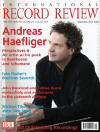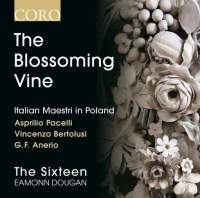Texte paru dans: / Appeared in:
*

International Record Review - (09//2014)
Pour
s'abonner / Subscription information
Coro
COR16123

Code-barres / Barcode
: 0828021612329
Consultez toutes les évaluations recensées pour ce cd
~~~~ Reach all the evaluations located for this CD
The Sixteen's Associate Conductor Eamonn Dougan initiated this new series devoted to the Polish Baroque with a recording of sacred music by the first non‑Italian music director at the Polish courts, Bartlomiej Pękiel (1633‑70). As Dougan noted in the booklet essay accompanying that very fine release (reviewed in September 2013), the Italian style nevertheless pervades Pękiel's music. Not only was the composer's Audite mortales once attributed to Carissimi, in modified stile antico works such as O adoranda Trinitas, the figure of Palestrina looms large.
This second volume in the series looks back to three Italian masters who worked at the court of King Sigismund III in Cracow and Warsaw during the late 1500s and early 1600s and who laid the groundwork for the Polish musical vine to blossom during the subsequent decades. As one would expect, Palestrina's presence is even more pervasive here. Vincenzo Bertolusi (c.1550‑1608) may have been trained in Venice but the other two composers featured in this recording, Asprilio Pacelli (1570‑1623) and Giovanni Francesco Anerio (c. 1567‑1630), were Palestrina's students.
The core of the programme, in which all the works have some association with the Virgin Mary, is Anerio's Missa 'Pulchra es', which is based on the Palestrina motet of that name, the text of which is taken from the biblical Song of Songs. Thus Dougan has also interspersed the Mass with two beautiful Song of Songs settings by Bertolusi while ending the recording with Pacelli's glorious Marian antiphon for 20 voices in five choirs and based on yet another text from the Song of Songs, Dum esset rex. The Mass is prefaced by a number of antiphons and other works by all three composers.
The exceptional quality of the music and the performances is a key feature throughout, and right from the powerful, ornate stile antico of Pacelli's opening Veni sponsa Christi for five voices, with its spectacular 'Alleluia', you know you're in safe hands – or should that be voices ? Dougan is a fine singer himself and a core member of The Sixteen: his approach to interpretation (and this I know from having recently taken part in one of the numerous public workshops The Sixteen generously holds as part of its outreach programme) is unfailingly creative and intelligent. Like the choir's regular conductor Harry Christophers, his focus is on the contribution of rhetorical detail to the dramatic effect of the whole.
This is most apparent not only in the potential for dramatic effects between the double choirs in the Missa Pulchra es' but in the meticulous attention to the balance between clarity of diction and multi‑hued sonority in the word‑painting throughout (listen, for example, to 'Oleum effusum nomen tuum' ‑ 'Your name is as oil poured out', in Bertolusi's Osculetur me osculo. But it is perhaps in the massive Dum esset rex, which slowly builds in grandeur and tension while recalling the hypnotic nature of Tallis's Spem in alium, that choir and conductor pull out all the stops, so to speak. This is a spectacular work, as effective on record as in live performance, and is here given the treatment it deserves, the singing a marvel of rich sonority and luminous transparency. And if I've used adjectives like that time and again in describing The Sixteen's sound, well it's with good reason.
Cliquez l'un ou l'autre
bouton pour découvrir bien d'autres critiques de CD
Click either button for many other reviews


